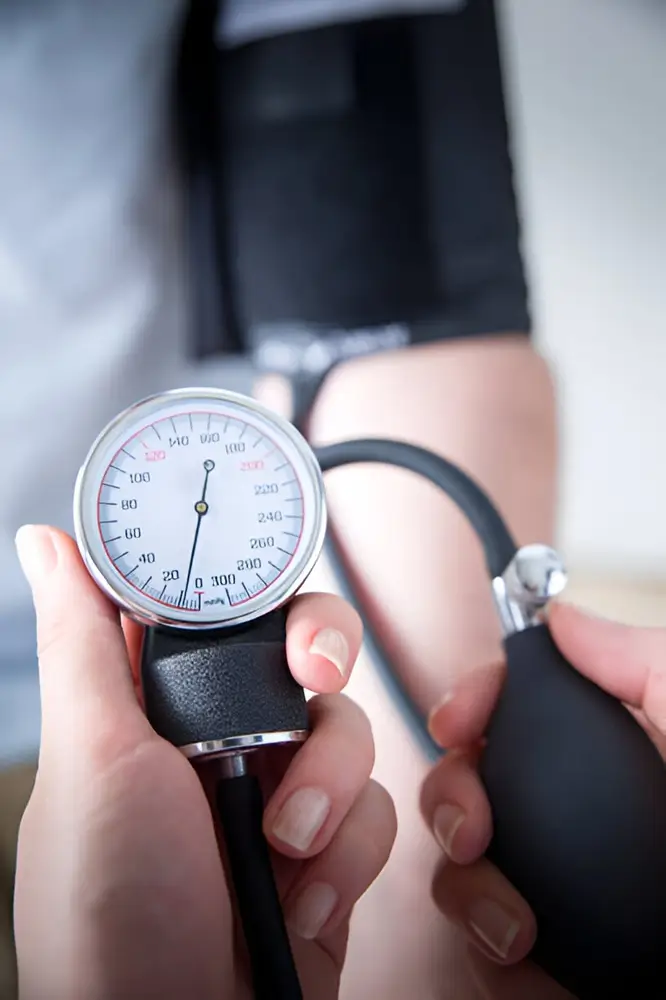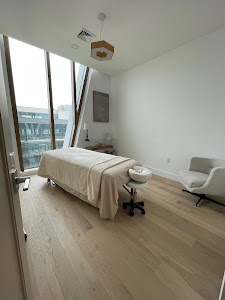Acupuncture for High Blood Pressure
Acupuncture for High Blood Pressure
What is High Blood Pressure?

Hypertension, often referred to as high blood pressure, is a condition in which blood exerts abnormally high pressure on the walls of the arteries. Over time, this constant strain on the circulatory system can lead to some serious complications, such as cardiovascular disease, strokes, and impaired kidney function.
Knowing how blood pressure is measured is essential to understanding blood pressure. Two key values are used: the systolic pressure (the upper number), which indicates the force exerted on the artery walls during the heart’s contraction, and the diastolic pressure (the lower number), which reflects the pressure when the heart relaxes between beats. An optimal blood pressure reading typically falls to 120/80 mm Hg in healthy individuals. When measurements consistently exceed 130/80 mm Hg, it signals the presence of hypertension or high blood pressure.
Unlike acute medical conditions that present with obvious symptoms, hypertension often develops quietly, without noticeable signs, making regular monitoring crucial. Prolonged periods of unchecked high blood pressure can weaken blood vessels and overburden vital organs, leading to long-term health challenges that might have been preventable with timely intervention.
What Causes High Blood Pressure
Understanding the causes of high blood pressure is essential for prevention and effective management.
- Lifestyle factors
- Poor diet. Diets high in sodium, processed foods, and low in fruits and vegetables contribute to hypertension. Excessive salt intake increases fluid retention, raising blood pressure.
- Lack of exercise. Physical inactivity weakens the heart and blood vessels, increasing the risk of hypertension.
- Obesity. Carrying excess weight places additional strain on the heart and heightens resistance in the blood vessels, which can result in high blood pressure.
- Excessive alcohol consumption. Regularly consuming alcohol in large quantities can strain the cardiovascular system.
- Smoking. Tobacco damages the walls of blood vessels and narrows arteries, contributing to increased pressure.
- Medical conditions
- Kidney disease. Impaired kidney function affects fluid balance, leading to higher blood pressure.
- Endocrine disorders. Conditions like hyperthyroidism or adrenal gland abnormalities can disrupt hormone levels, influencing blood pressure.
- Sleep apnea. Interrupted breathing during sleep causes stress on the cardiovascular system, raising blood pressure over time.
- Genetics and age
- Family history. If close relatives have hypertension, you may be at a higher risk due to genetic predisposition.
- Age. Blood vessels naturally stiffen with age, making it harder for blood to flow freely, which increases pressure.
- Stress and psychological factors
- Long-term stress may trigger habits such as overeating, smoking, or a lack of exercise, all of which can indirectly raise blood pressure.
- Stress hormones also temporarily spike blood pressure levels, which can become a chronic issue if stress is not managed.
- Environmental factors
- Workplace stress. High-pressure jobs or long working hours can increase the risk.
- Pollution exposure. In recent studies, long-term exposure to air pollution has been linked to hypertension.
High Blood Pressure Symptoms
Hypertension typically presents no noticeable symptoms. However, some individuals may experience:
- Headaches
- Shortness of breath
- Nosebleeds
Such symptoms of high blood pressure emerge only when blood pressure becomes critically elevated, highlighting the need for consistent monitoring.
What are the Types of High Blood Pressure?
Hypertension is categorized into:
- Primary (essential) hypertension gradually occurs over time and lacks an identifiable cause.
- Secondary hypertension arises due to underlying health issues like kidney dysfunction, hormonal imbalances, or the effects of specific medications.
Determining the specific type is crucial for choosing the right treatment approach.
Can Acupuncture Help With High Blood Pressure?
Acupuncture uses thin needles placed at precise points on the body to harmonize the energy flow, known as “qi.” Some studies suggest that acupuncture may assist in lowering blood pressure by:
- Balancing hormones. Affecting the renin-angiotensin-aldosterone system to manage blood pressure and maintain fluid equilibrium.
- Stimulating тerve уndings. Affecting the autonomic nervous system to promote relaxation and reduce stress.
While acupuncture for high blood pressure shows promise, it should complement, not replace, conventional treatments.

The Science Behind Acupuncture and Blood Pressure Regulation
Studies indicate that acupuncture may lower blood pressure by:
- According to 2021 research, dopamine may reduce oxidative stress—caused by an excess of free radicals—and help maintain balanced blood pressure.
- Research also indicates that acupuncture can relax the walls of your arteries and veins, potentially helping to lower your blood pressure.
- A small 2015 study involving 33 participants found that those treated with acupuncture had lower systolic and diastolic blood pressure after eight weeks of treatment.
These research suggests that acupuncture may support blood pressure regulation by reducing oxidative stress, relaxing blood vessel walls, and delivering measurable improvements in systolic and diastolic pressure, as evidenced by clinical studies. These findings highlight the potential of acupuncture as a complementary approach to cardiovascular health management.
Benefits of Acupuncture Over Conventional Treatments
Acupuncture offers several advantages:
- When performed by a certified practitioner, acupuncture is generally safe with few adverse effects.
- Addresses the root causes, such as stress and hormonal imbalances.
- It can be integrated with standard treatments to enhance overall efficacy.
However, consulting the doctor before incorporating acupuncture into your high blood pressure treatment plan is essential.
Acupuncture Treatment for High Blood Pressure at Pulse Acupuncture
At Pulse Acupuncture we provide a holistic approach to healing through our acupuncture services at our locations in Clifton, NJ, and Williamsburg, Brooklyn. Our certified practitioners focus on specific acupuncture points for high blood pressure.
At Pulse Acupuncture, our holistic approach not only includes acupuncture but also embraces natural remedies for high blood pressure, such as dietary guidance and customized herbal therapies. By integrating traditional techniques with modern understanding, we offer services like acupuncture for tennis elbow, acupuncture for shoulder pain, acupuncture for nausea and acupuncture for neuropathy. Our mission is to harmonize your body and mind, guiding you on a personalized journey toward optimal health and well-being.
-
Marina Doktorman, M.S., L.Ac., is an experienced acupuncturist who obtained her Masters of Acupuncture from the Tri-State College of Acupuncture in New York City in 2001. During her studies, she focused on Chinese Herbology, a branch of Traditional Chinese Medicine (TCM) that utilizes herbs to complement acupuncture treatments. Marina is licensed in both New York (NY) and New Jersey (NJ) and holds a Diplomate of Acupuncture from the National Certification Commission for Acupuncture and Oriental Medicine (NCCAOM), indicating her expertise in the field.
Why Pulse Acupuncture?

Experience
Marina Doktorman, L.Ac. has over 20 years of clinical experience.

RELAXATION
At Pulse Acupuncture, we aim to cultivate a spa-like environment.

Comfort
All of our needles are of the highest quality for painless insertion.
Patient Reviews in Brooklyn


I had the pleasure of working with Marina, Laryssa, and Jaesung, and they have all been absolutely amazing. Thanks to this incredible team, I can now sit, drive, walk, sleep comfortably, and function normally again. I truly don’t think I’d be where I am today without their care and expertise.
Pulse Acupuncture has become my go-to place for anything pain-related. The entire team is warm, compassionate, and professional, with outstanding bedside manners.
I highly recommend Pulse Acupuncture to anyone experiencing pain and looking for effective, non-invasive treatment. Truly life-changing! 😊











Marina is very accommodating, kind, and attentive, and her staff is a pleasure to deal with. I highly recommend Pulse.














Acupuncture has truly changed my life and has helped me in ways I didn’t even know were possible.
I started doing acupuncture to balance my hormones after 2 years of unsuccessful fertility treatments. When I started seeing Marina, my periods were starting to be regular and I was dealing with a few different symptoms which we started treating right away (constipation, random headaches, body aches)… in the last 3 years I have not been sick (no flu, have never tested positive for COVID) - Marina even treated me for allergies more than a year ago during an allergy episode in changing seasons.
Also want to mention Larissa as I started seeing her in Marina’s beautiful office and she’s also contributed to my wellness journey. Acupuncture is my favorite wellness practice, I see them regularly and have never felt better. I sometimes just tell them whatever I’m thinking/feeling knowing they will stick some needles in different places of my body and I come out floating and feeling so relaxed.




Excellent service- great results- highly recommended ~!





Marina is not only incredibly knowledgeable, but also very calming and has great bedside manners. If you're looking for a fantastic acupuncturist I can't recommend her enough!!













After 10 minutes of the procedure, you get into a different reality. Marina is knowledgeable, answers all the questions. After the procedure, the skin of the face glows, the body becomes lighter by a couple of pounds. I've been looking for such a procedure and state of mind for a long time.


I am beyond grateful to Marina, because after trying so many things, I almost lost hope. highly recommend Pulse Acupuncture and Marina for anyone seeking relief from pain or other health concerns.
The acupuncture sessions themselves are incredibly relaxing and therapeutic. Marina's gentle touch and precise needle placement always leave me feeling calm and rejuvenated. She also incorporates other techniques, such as cupping, which have been very beneficial for my overall health and wellbeing.
In addition to her skill as an acupuncturist, Marina is also a wonderful person to work with. She is warm, friendly, and genuinely cares about her clients' wellbeing. I always leave our sessions feeling refreshed and uplifted, both physically and mentally.
Overall, I highly recommend Pulse Acupuncture and Marina for anyone looking for high-quality acupuncture and personalized care. Thank you, Marina, for your exceptional service and dedication to helping others achieve optimal health!
Acupuncture for High Blood Pressure - FAQ
Can acupuncture help with high blood pressure?
Yes, research suggests that acupuncture may help manage high blood pressure by stimulating points that regulate cardiovascular function and promote relaxation. It may reduce stress, improve blood circulation, and support the body’s natural ability to balance blood pressure.
How does acupuncture lower blood pressure?
Acupuncture works by targeting points along specific meridians that influence the cardiovascular system. Stimulating these points can activate the nervous system, helping to regulate heart rate, reduce stress hormones, and dilate blood vessels, which may contribute to lowering blood pressure.
How many sessions of acupuncture are needed to see results?
The number of sessions required varies from person to person, depending on the severity of high blood pressure and individual response to treatment. Some people notice improvements after a few sessions, while others may require regular treatments over weeks or months for optimal results.
What are the key acupuncture points for high blood pressure?
Common points used to address high blood pressure include:
– LI4 (Hegu): Located on the hand, this point is believed to reduce stress and improve circulation.
– ST36 (Zusanli): Found on the leg, this point is used for overall energy balance and blood flow.
– PC6 (Neiguan): Situated on the forearm, this point may help regulate heart function and reduce anxiety.
Your practitioner will tailor the treatment to your specific needs.
Contact us
Acupuncture therapy at Pulse Acupuncture Practice, at Clifton, NJ and Williamsburg, Brooklyn, NYC offers unique combination of various cupuncture types for healing on all levels: emotional, spiritual and physical by integrating ancient wisdom of energy healing with modern acupuncture techniques.


